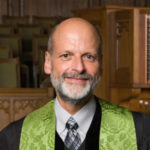 Dear friends,
Dear friends,
This Sunday in Sanctuary Worship we are continuing the seven-part series Jesus the Good Troublemaker. Jesus’ behavior was scandalous. He was a troublemaker. He brought about change wherever he went. He broke the religious laws for a higher priority. He refused to make God’s grace fit the small box people always try to put it in. He associated with the wrong sort of people. He shocked people. He challenged them to look at the world and to live life in a different way. He challenged religious and secular authorities. He made them angry. He upset the routines.
This Sunday my sermon is “The Good Trouble of Singlespeak.” Now, as far as I know, “singlespeak” isn’t a real word, but I coined it as a contrast to “doublespeak,” which is a real word.
We live in an age of doublespeak, a word that comes from a concept in George Orwell’s book 1984, except in his book the terms are “Doublethink” and “Newspeak.” Using doublethink, a person could hold two opposing ideas in his or her mind at the same time, fully believing in both ideas. “Newspeak” was the official language used to express the ideas of doublethink.
We hear and read doublespeak every day, but what, exactly, is doublespeak? Dictionary.com defines doublespeak with these words: “evasive, ambiguous language that is intended to deceive or confuse.”
In his bestselling book Doublespeak, William Lutz notes that doublespeak is not an accident or a “slip of the tongue.” Instead, it is a deliberate, calculated misuse of language. Lutz provides several defining attributes of doublespeak:
- misleads
- distorts reality
- pretends to communicate
- makes the bad seem good
- avoids or shifts responsibility
- makes the negative appear positive
- creates a false verbal map of the world
- limits, conceals, corrupts, and prevents thought
- makes the unpleasant appear attractive or tolerable
- creates incongruity between reality and what is said or not said
So, what did Jesus have to say about this?
Our scripture reading for Sunday comes from Matthew’s collection of the teachings of Jesus called “The Sermon on the Mount.” This teaching of Jesus is found only in this gospel. A similar saying is found in the letter of James, chapter 5, verse 12.
It is a demand for the truthfulness of all our words.
Jesus said, “Let your yes mean yes, and your no mean no. Anything more than this comes from the evil one.” (Common English Bible)
Jesus is saying that either the very fiber of our souls is honest or else, sooner or later, somehow or another, the garment of our lives will unravel. Jesus taught those disciples that they should live their lives so honestly that no one would ever even think to question their integrity. No one would ever think to ask them to take an oath — “Cross your heart and hope to die. Now promise me you’re telling the truth.” He said it this way: “Do not swear at all, either by Heaven … or by earth … Let what you say be simply ‘Yes’ or ‘No’; anything more than this comes from evil.” James paraphrased those words and wrote: “Let your ‘yes’ be ‘yes’ and your ‘no’ be ‘no’.”
Sunday we’ll be challenged by Jesus the Good Troublemaker to the discipline of truth-telling and clarity. Can you think of examples of doublespeak? How is doublespeak harmful? What would it be like if we said what we mean and we mean what we say?
Grace and Peace,
![]()
Dr. Tim Bruster
Senior Pastor
Matthew 5:33-37
33 “Again you have heard that it was said to those who lived long ago: Don’t make a false solemn pledge, but you should follow through on what you have pledged to the Lord.
34 But I say to you that you must not pledge at all. You must not pledge by heaven, because it’s God’s throne.
35 You must not pledge by the earth, because it’s God’s footstool. You must not pledge by Jerusalem, because it’s the city of the great king.
36 And you must not pledge by your head, because you can’t turn one hair white or black.
37 Let your yes mean yes, and your no mean no. Anything more than this comes from the evil one.

